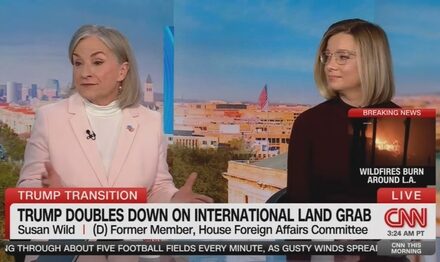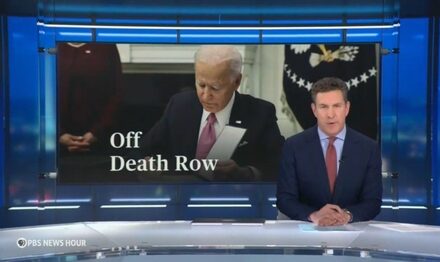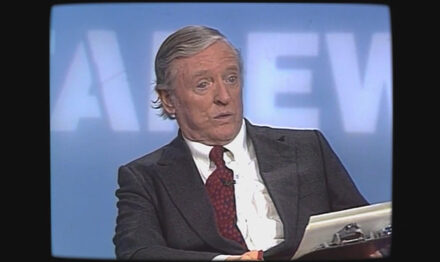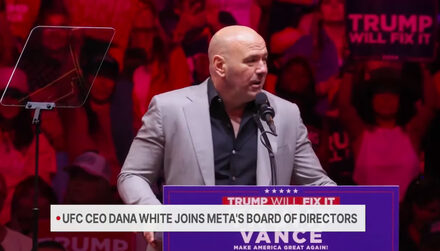We support our Publishers and Content Creators. You can view this story on their website by CLICKING HERE.
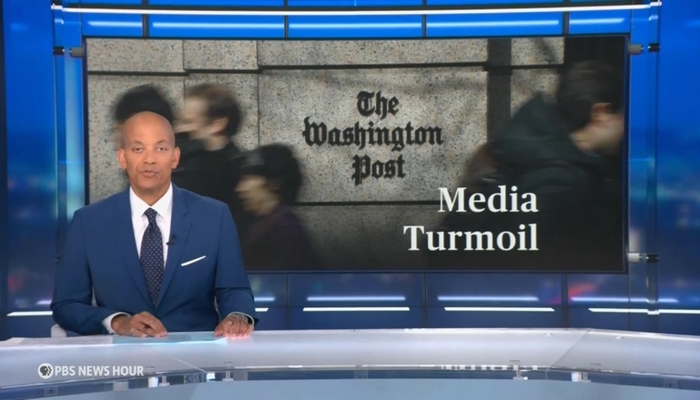
Monday’s PBS News Hour featured an interview on the current meltdown at the Washington Post with blunt-talking liberal journalist Kara Swisher, the class-conscious nemesis of Elon Musk and now of Jeff Bezos, founder of Amazon and owner of the Post. In Swisher’s eyes, he used to be one of the good billionaires. At least until he belatedly realized his paper was slanted and is now making some moves to recalibrate — though that’s not how Swisher phrased it.
Swisher was obliged to disclose a burgeoning conflict of interest when talking about Bezos:
Swisher clarified that she was “thinking about it” and “talking to a lot of people because I’m just disturbed by what’s happening there.” Asked to explain why, she rambled about her career in journalism, which began in the Post’s mailroom, then took a cynical view of Bezos making nice with Trump without mentioning the paper’s liberal ideological slant.
She went on to say that Bezos “never really figured out what to do post the first Trump era….now he’s doing things that are making it worse. And I’m not sure why, right? I’m not sure what’s happening with him. And I think he’s — again, he’s been a very good owner until recently….”
Hmm. What’s happened recently? Bezos trying to prod his paper toward objectivity?
Invited by Bennett to “redesign the current media ecosystem,” given the “limited reach and limited influence” of the mainstream press (insight at last!), Swisher bragged about her perspicacity again, then took shots at billionaires as a class.
Apparently Post readers should be at the mercy and kindness of Swisher, who will call you “sort of anti-American” for opposing pro-Hamas protesters on college campus, and who advised Joe Biden (when he was running) to “get in there very hard and go ‘rapist, racist, fascist’ over and over and over again” against Donald Trump.
PBS News Hour
1/6/25
7:42:37 p.m. (ET)
Geoff Bennett: Staff at The Washington Post are bracing for a wave of layoffs that are expected to be announced this week. It’s the latest hit for The Post, coming just days after a longtime editorial cartoonist, Ann Telnaes, resigned in protest. Her editor rejected her latest cartoon, which depicted Post owner Jeff Bezos and other media leaders on bended knee before president-elect Trump. The Post said the cartoon was rejected because it had been repetitive of a recent column and another that was set to be published. Her editor in the statement said, in part: “Not every editorial judgment is a reflection of a malign force.”
To many observers, though, it’s the latest in a series of events that are raising questions about Bezos and the leadership of The Post, including a series of high-profile staff departures and a wave of reader backlash.
For more on that, we’re joined now by Kara Swisher, multiplatform journalist, entrepreneur, and author of “Burn Book: A Tech Love Story.”
Thanks so much for being with us.
Kara Swisher, Author, “Burn Book: A Tech Love Story”: Thank you for having me.
Geoff Bennett: And we should mention that you are putting together an investor group to buy The Washington Post. Jeff Bezos has…
Kara Swisher: I’m thinking about it, yes.
Geoff Bennett: Thinking about it.
Kara Swisher: Yes, I have been talking — I’m talking to a lot of people because I’m just disturbed by what’s happening there. I’m sure other people are too. The question is if he wants to sell it. He hasn’t indicated any interest whatsoever, but I wanted to raise the idea because I think it needs new leadership and new management.
Geoff Bennett: And — right, I was going to say he’s given no indication that he intends to sell it.
Kara Swisher: Yes.
Geoff Bennett: But what’s the vision? Why are you in the hunt?
Kara Swisher: Well, I started off at The Washington Post in the newsroom — in the mailroom. Excuse me. That’s where I started my career when I was at college at Georgetown University. And so that was my first job. And I worked there for many years.
I started covering the Internet there, which is my big area. I went on to work at The Wall Street Journal and The New York Times and did a whole bunch of different things, including a very famous tech conference that was pretty good.
And so I have been watching what’s happening at The Post for a long time. And I was quite heartened when the Grahams, family which had owned it for so many years, sold it to Jeff Bezos. And in the initial years, he did a very good job. He got it for a very low amount of money, by the way. But he was doing a very good job.
And it’s just recently that his business interests are not aligned with The Post. And everything he’s done so far over the past, I don’t know, year or so has been pretty questionable, I would say, not because necessarily it’s malign. I don’t — I mean, bringing in malign forces, it sort of takes it to a new level.
I think he has business interests that are not aligned with The Post. And some of his selections have been bad, including pulling the endorsement of Kamala Harris at the last minute. There’s always some excuse. He didn’t see it. He didn’t read it.
It doesn’t really matter. He’s involving himself in ways that are aren’t working for The Post, which is also in distress as a business at this moment.
Geoff Bennett: Well, on that point, I mean, strong journalistic ethics prioritize independence.
Kara Swisher: Sure.
Geoff Bennett: And Jeff Bezos obviously isn’t a journalist. He’s a businessman.
Kara Swisher: No, of course.
Geoff Bennett: And you can make the argument that he has a fiduciary responsibility to minimize any scrutiny or retaliation that could affect The Post or his broader media empire.
Kara Swisher: Yes.
Geoff Bennett: I mean, what do you say to that argument?
Kara Swisher: Well, there’s only one shareholder here, and that’s Jeff Bezos. So he can do whatever he wants. So it’s not like it’s a public company, and there’s other things.
But other public companies have been very explicit that they’re going to do fair and accountability coverage of the things. And I think some of the actions he’s taken, including with Ann, who’s an amazing Pulitzer Prize-winning cartoonist, I don’t think Jeff had anything to do with this decision.
I think it was done by David Shipley. But it’s in this mood of not poking the bear, I think, the bear being Trump or Jeff Bezos. I don’t know which one they’re not trying to poke. But what happened to The Post was, Jeff bought it in 2013 and did a lot of stuff that improved it, but they never really figured out what to do post the first Trump era, which gave a bump to a lot of people.
And so, in many ways, it’s his fault of where it is. And now he’s doing things that are making it worse. And I’m not sure why, right? I’m not sure what’s happening with him. And I think he’s — again, he’s been a very good owner until recently, I would say. And now he just doesn’t — I’d like to know why he wants to own it, what his plans are.
The plans that they have outlined seem preposterous, really. I don’t know what else to say. He’s a very good businessperson, but a lot of these ideas are really an antithesis of what an independent newspaper should be. And I don’t mean to stay in the past. And The Post has a storied history. I’m a journalist who’s blown up a lot of things. I believe in changing and shifting.
But you have to come up with something that preserves the integrity of The Post and at the same time makes it into a pretty good business.
Geoff Bennett: Are there lessons The Post could learn from The New York Times’ multimedia diversification or from the rise of digital native outlets like Axios or Substack or Semafor? The list goes on.
Kara Swisher:
Well, I don’t mean to be rude, but I did the first one, which was called AllThingsD at The Wall Street…
Geoff Bennett: That’s right. Yes.
Kara Swisher: We — Walt and I — Walt Mossberg were the O.G. of all this stuff. It’s funny when it’s like, oh, this is new. I’m like, no, we did it a long time ago, because we did see what was coming and the importance of digitization of media and how the consumer had changed really drastically.
And we also supplemented it by having a conference that was highly lucrative that could pay the bills too, because news is hard. Advertising is tougher. Some people have done subscriptions really well. Like, The Information does great journalism and does subscriptions. Other things rely on advertising, like we did at AllThingsD, or sponsorship like we did at the Code Conferences.
There’s all kinds of things you could look at, and The New York Times is one way of doing it. They do everything, they cook everything internally, right? But they did an important diversification. News is not the driver of the growth of The New York Times right now. It’s Wordle. It’s cooking. It’s sports. It’s all kinds of things.
And that’s important, for a news organization to have multiple revenue streams around it, especially as people, especially young people, go off and get things from TikTok or Instagram or wherever they happen — or YouTube, for example, has become critically important in the TV watching space.
And so The Post hasn’t really done anything. They don’t have a podcast division to speak of. Other companies have done a really good job at that, and it can be very lucrative. I have some ideas, which I will outline if I get a meeting with Jeff. I have known him for — I knew — I met Jeff before he was a billionaire, when he first started Amazon.
He’s a wonderful entrepreneur. And I think he has to understand that maybe where he is today is not where he was and that he may not be the correct owner for this thing. That’s all. I just want to talk to you about it and understand why he wants to own it if he continues to do these things that are causing a huge amount of people to leave, very — a huge amount of talent.
And that’s not — that’s hard to get back. So I have some ideas of different structures, financial structures, the way you could do it, and I’m sure other people do.
Geoff Bennett: Well, if you could redesign the current media ecosystem to better serve the public in this polarized, fractured and fast-paced era, what would you prioritize, especially since, after this last election, we learned to the degree to which legacy media has limited reach and limited influence?
Kara Swisher: Yes.
Well, that’s been happening for a long time. It’s something I warned of in my book and many — for years and years, I wrote this column. I’m like, everything that — the thing I said over and over again is, everything that can be digitized will be digitized and it was, right? This was at the beginning of my career.
And I think one of the things they have to recognize is, where is the audience? The audience has taken control of the media. And it’s not giving it back any time soon. So you go where they are going, you try to create things they want to consume. It doesn’t have to be light. It doesn’t have to — there’s a terrible word in media, make it snackable. I think that’s the worst thing I have ever heard in my life.
But make it interesting. I mean, I have a million ideas of what you can do and how you could structure it so it’s more protected. But being at the mercy and kindness of billionaires, good luck with that. I’m sorry. It’s — maybe a lot of billionaires, so none of them have control, but a single billionaire? I don’t care how you slice it. And I don’t know how nice that billionaire is. It’s never going to end well. It just isn’t.

 Conservative
Conservative  Search
Search Trending
Trending Current News
Current News 